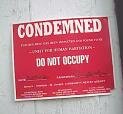What Is A Market Price?
by Vince?Daliessio
?
This morning I read of residents' disappointment with a developer's offer for their homes in an area of Westville NJ slated for "redevelopment". Apparently Fieldstone Associates is backing up these lowball offers by conspiring with the borough of Westville to confiscate their properties if the residents do not accept the offers;
...Fieldstone Associates sent written offers to owners of 24 homes and businesses in the borough's redevelopment area. Fieldstone principal Art Corsini said that the offers would hold only if the borough decides to go through with the redevelopment plans this fall.
Corsini said the company used Rhoads Realty to do a market analysis and come up with "fair market value." Rhoads Realty declined comment, but Corsini said the analysis took into account the recent sales, location, waterfront access, recent improvements and maintenance of each property.
"Fair market value" used in this manner?is a term of art, a fraud, a fiction, and by definition cannot ever be a "market price". It exists because the developer?wants to buy the property for far less than the "market price". The difference between "fair market value" and "market price" (less the?money paid?to the borough for its cooperation) is called "profit", or, more accurately, an "economic rent";
"I had to read it a couple of times to make sure I was reading it correctly," said homeowner George Baker of Edgwater Avenue. "It's probably about one third, if not one quarter, of what is really a fair market value for my property."
"They were supposed to make a good faith offer," said Delores Achilles, one of the owners of Grabbe's Seafood Restaurant. "This is not a good faith offer."
A "market price" is defined by the great economist Ludwig von?Mises in Human Action as the price at which an exchange will occur, free of coercion. It means the price at which the two parties involved in a potential transaction both feel that they are getting something they value more highly than the thing they posessed before. In the case of an uncoerced?real-estate transaction, for example, the buyer offers the seller a sum of money. Implicitly he personally values the property more than the sum he is offering. If the buyer accepts the sum, then he values the sum of money more than the property he is offering. Therefore, the exchange WILL occur at this sum, which is by definition the "market price". This is free enterprise in action.
An exchange that is coerced, on the other hand, can NEVER be at "market price" or "fair market value" BY DEFINITION. Coercion often takes the form seen here in Westville - a developer sees an area as offering the potential for great profit if he can buy it cheaply enough. Since he knows it's easier and cheaper to bribe (through the promise of increased ratables) the borough into threatening residents with condemnation than to negotiate a "market price" with each?resident, it is a no-brainer.?
All exchanges that occur under this "redevelopment" scheme are coerced, and therefore by definition do not occur at? a "market price". The interference of the borough in the transaction in this manner defrauds the residents of a true "market price". Of course, the borough denies having anything to do with the interference;
Bill Bittner, borough administrator, said the borough has had no part in the negotiations. "It is not our responsibility to be involved with private negotiations for these properties," said Bittner, adding that since Friday he has received one phone call from a property owner complaining about Fieldstone's offer. "If Fieldstone is negotiating, they're doing so on their own behalf."
This is a flat-out lie. The developer would have absolutely no reason to lowball these properties in this manner if he did not have the muscle of the borough behind him. The borough is his silent partner, the way a big "leg breaker" is the silent partner of a loan shark. Bittner reveals this inadvertently;
Fieldstone's plans for the $40 million project include a restaurant, a marina, a public boat ramp, an open walkway along the water, townhouses -- 3- and 4-story units with single living flats, and between 5,000 and 15,000 square feet for commercial use along Broadway. If the borough approves the plans, those who cannot reach an agreement with Fieldstone could have their properties condemned by the borough, Bittner said.
The developer is lying too;
"But we don't want to see any of these properties condemned via eminent domain," said Corsini. "We want to pay the property owners what they believe, and what we believe, to be fair prices."
The fruits of the Kelo decision are ripe for the picking by connected developers, in part because of the economic ignorance of most folks, and in part because of the cynical scheming of developers and municipalities. Thus, the residents are not dealing with an economic actor in a free market, they are instead dealing with a rent-seeking enterprise that is using the borough of Westville to produce a profit. This is just wrong. Unfortunately, according to the US Supreme Court, this kind of state-sanctioned?taking of private property for private gain is perfectly legal.